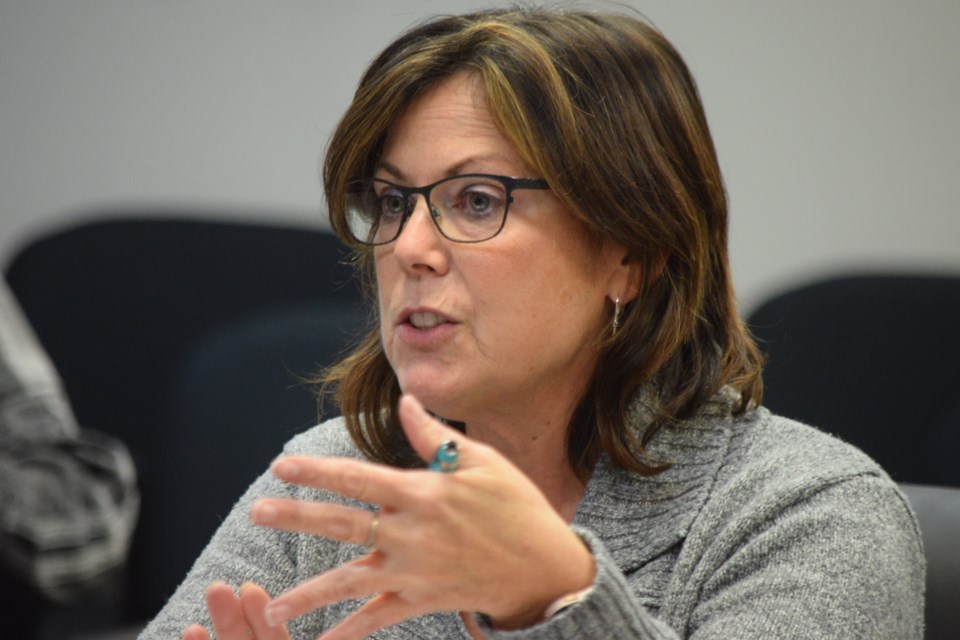BARRHEAD - Barrhead and District Family Community Support Services (FCSS) have created a keychain for municipal community peace officers, the RCMP, and other officials to give to those with housing insecurity and help connect them with the services they need.
FCSS executive director Karen Pronishen said the key chains include laminated cards
She added that people often do not know where to turn in any community, especially in smaller rural communities, noting that many services are not readily known or cannot be accessed locally.
"Things like Alberta Supports, us here at FCSS, and some of the programs we run like the Food Bank, Barrhead Employment, the Barrhead Pregnancy Centre, suicide prevention information and hotlines available to them, the [Ripple Connection Support Centre] and its lunch program, and other supports provided by the Barrhead CARES, is a coalition of community organizations who banded together in 2003, initially as the Barrhead and District Drug Coalition, to combat the problems associated with effects of alcohol and drug use in the community. A decade later, the coalition rebranded to reflect its growing youth and social initiatives mandate.
Pronishen said the key cards were the first project a local committee created in the spring to combat the growing housing security issue in the greater Barrhead region.
Committee representatives include the Barrhead municipality's community peace officers/bylaw enforcement departments, the Ripple Connection Support Centre (RCSC), Healthy Families, Servus Credit Union, Barrhead and District Social Housing Association, Canadian Centre for Caregiving Excellence, and Barrhead FCSS.
She added that the committee also has members and is still accepting interested organizations and individuals. Pronishen said the RCMP are not part of the group now, but they hope they will also be represented soon.
"Right now, we are working on getting everyone on the same page to provide a coordinated approach to address the emergency needs of homeless and housing insecure individuals through effective engagement, immediate assistance, and streamlined referral to appropriate support services, " Pronishen said.
She added the committee is also looking at lessening the strain on enforcement officers by giving them practical tools to engage those who are housing insecure.
When asked what services the Barrhead area offers for those who are currently housing insecure, Pronishen said it varies depending on the individual's needs.
She gave the example of a client, FCSS, who recently helped a relative newcomer to Barrhead who had come to the community because of the promise of work.
"Things did not work out. He was from another province, had no family in the area, and had no place to stay," Pronishen said, adding that FCSS could arrange emergency accommodations and food for one night until a friend arranged to pick him up.
When it comes to situations of people fleeing domestic violence, FCSS' priority is to find them shelter outside the community.
However, due to the timing, available shelter spaces and transportation issues, Pronishen says that FCSS and other community services must attempt to arrange temporary emergency accommodations.
Making things more complicated, Pronishen said, is that often one of the issues when attempting to find housing for the homeless or housing insecure is the issue of addiction.
"To get housed, often you have to be sober or not using," she said, adding the result is that despite organizations like FCSS' best efforts, sometimes people are left unhoused.
Pronishen added that the near-zero vacancy rate in Barrhead makes things even more complicated, which means they have to look further afield to find housing.
"We do have a list of area rental properties, and if they happen to get lucky and get in, we can help connect them to Alberta Supports, who can then give them added assistance in securing housing," she said, "But again, because of the lack of available housing, more often than not, we have to look outside of our community."
Pronishen noted it is more than just newcomers who find it difficult to find and maintain housing.
"It is not easy. Yes, some are relative newcomers that have some attachment to the community, such as their children live here, but some people are born and raised here, and they are facing leaving the community to find adequate shelter," she said. "Our resources are limited, and we know that we are on the brink of becoming homeless or being housing insecure.
Barry Kerton, TownandCountryToday.com



